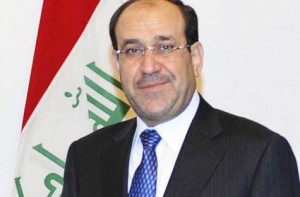Al Maliki Wins a Narrow Victory in Iraq Elections
Tuesday, May 20th, 2014 11:40:43 by Khalil Khan
Iraqi Prime Minister Nuri al-Maliki, was voted in legislative elections last month, but is far from the majority. The State of Law alliance recieved at least 92 of the 328 seats in parliament, according to provisional results released Monday by the Electoral Commission. Al-Maliki will have to seek support from other groups to form coalition government. That success is a setback for Al Maliki political opponents, both Shiites and Sunnis and Kurds.
The success of the State Law alliance is evident. Topping the results in 10 of the 18 provinces and has won 30 seats in Baghdad, where Maliki has received 721,000 direct votes, the highest figure for a candidate nationally.
The main rivals of the prime minister have achieved between 20 Members of Al Wataniya (Iyad Allawi) and 29 Al Muwatin (Ammar al-Hakim). Even if the latter were allied with the Sadrists, who have 24 seats and the support of 7 independent, would only total 60 legislators. These data shall be final once the Electoral Commission completes rulings on allegations of irregularities in the coming weeks, certainly support his aspiration for a third term despite the reluctance of his opponents.
In fact, negotiations for this purpose appear to be underway. Agence France Presse echo of a letter that the State of Law sent earlier this month to several rival formations proposing a government program. The 18 -point plan emphasizes support for women’s rights, equitable distribution of resources and the rejection of sectarian politics, a nod to seek support outside the Shiite Arab community that Al Maliki belongs to three fifths of Iraqis.
Both former Prime Minister Allawi, as the influential Shiite cleric Muqtada al-Sadr and Kurdish President Massoud Barzani, accused Maliki of hoarding power and exacerbate sectarian violence that has caused at least 3,500 deaths since the beginning of the year. The discomfort is also evident in the streets. But Iraqis do not seem to have found a better alternative among the 9,000 candidates contesting these legislative third since the U.S. overthrew Saddam Hussein and the first without foreign troops in the country.
Despite the disappointment with the lack of public services and political paralysis, 62% of the 22 million voters exercised their right to vote, the same share as in 2010. Then Al Maliki won 89 seats compared to 90 for Allawi but used his control of the levers of power to form a coalition government, which took nearly nine months.
Once the results are ratified, the President has 15 days to convene the new parliament. The deputies then appoint the Prime Minister, the Speaker of the House and the head of state. According to an unwritten rule, such charges are distributed among the three main communities: Arab Shiite, Sunni Arab and Kurdish.
Short URL: https://www.newspakistan.pk/?p=44252

















